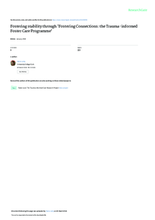Introduction
Fostering stability for children is at the heart of foster care. It may involve supporting children to return to their birth family, to remain long-term in foster care, or to be adopted from foster care. Achieving stability can be challenging because foster care occurs in a complex system that involves many others beyond the child. In addition, the achievement of stability can be influenced by the complex nature of trauma and attachment-related difficulties, which may stem from a child’s experiences prior to coming into foster care. A research collaboration was set up in 2016 between University College Cork (UCC) and Tusla – Child and Family Agency (Lotty, 2017). This sought to make a contribution to fostering stability through applying the approach of traumainformed care. This article describes some of the research outcomes and the ongoing work of this collaboration.

